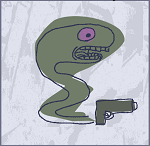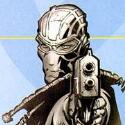|
Usually when I find a story inscrutable I find it easy to take refuge in the mental shelter of assuming the author was just bullshitting, but somehow that's not the takeaway I had from Hal Duncan's "Vellum" when I chugged the audiobook a year or two ago. It's got a sort of multiverse premise, but unusually for such stories, it seems to be more about mirrors of the same characters from world to world than it is a voyage between worlds (although one of those is going on in parallel)? And I think that characters' reflections across realities don't always have the same names? I think maybe the book just isn't conducive to audio processing (no ability to flip back and forth and compare stories). And then there's a bunch of god stuff? And nanites? Basically, I don't get it, although it's possible I just wasn't paying enough attention/sufficiently sober at key points to parse it all correctly. Does anyone know of a comprehensive explanation for what's going on? I haven't read Ink, but I couldn't care less about THPOILERTH, so if that sequel renders less opaque the contents of the first, I'd be happy to hear about it. I really liked the book, in spite of not getting it at all, and keep meaning to reread it, but I'm daunted at the prospect of embarking on that journey again with no more of a map than I had the first time. Maybe I could take notes on all the character names Hal uses and try to figure out who's who? It's so rare to read a novel and not even know by the end how many characters it had.
|
|
|
|

|
| # ? Apr 25, 2024 18:41 |
|
Read Ink. You'll probably end up even more confused but it'll be about different things and it's the better book. From what I remember, the explanation for just about anything is parallel universes and characters having similar stories or roles from world to world. There's not much overarching plot in Vellum.
|
|
|
|
|
crawlkill posted:Usually when I find a story inscrutable I find it easy to take refuge in the mental shelter of assuming the author was just bullshitting, but somehow that's not the takeaway I had from Hal Duncan's "Vellum" when I chugged the audiobook a year or two ago. It's got a sort of multiverse premise, but unusually for such stories, it seems to be more about mirrors of the same characters from world to world than it is a voyage between worlds (although one of those is going on in parallel)? And I think that characters' reflections across realities don't always have the same names? I think maybe the book just isn't conducive to audio processing (no ability to flip back and forth and compare stories). And then there's a bunch of god stuff? And nanites? Ink doesn't have characters; it has archetypes which you identify by certain traits in each story they show up in, and each story tells you a little more of the story of the war in heaven. If you've never been exposed to comparative mythology stuff like the Golden Bough or Campbell's monomyth it can get kind of inscrutable. I remember Ink being a little easier to follow, but that could be because it focuses on archetypes that are already somewhat established in the first book so you spend less time piecing them together.
|
|
|
|
I have never been more excited by a concept from an author and then seen it rendered so terribly. Just terrible garbage! I read 'em both.
|
|
|
|
Yeah, Vellum was an infuriating bloody slog of a book. I read it earlier this year:My Goodreads posted:I forget who originally recommended this book to me, but I remember their pitch was something like "It's a little like American Gods, but much more complex, and also queer". It's got a lot of American Gods in it, but also the Sumerian parts of Snow Crash and a vague postmodern sense of detachment from time and location. There's one(?) gay character, so there's that. Also there's a heavy coating of turn-of-the-millennium DeviantArt edginess. I'm not sure if this review will be spoilery, because honestly I couldn't tell you most of what goes on.
|
|
|
|

|
| # ? Apr 25, 2024 18:41 |
|
I loved these books when I was fourteen and still capable of being astonished by tenuous parallels in comparative mythology. The only specific bit I remember with any fondness or clarity is in the second book, where the titular Ink (a swarm of nanomachines) "rewrites" the Vellum in an attempt to satisfy everyone's desires. Due to conflicting and incompatible ideologies, most of reality gets turned into featureless grey wasteland, except for a few strongholds where like-minded people have banded together. That was kind of neat. The overarching theme was, I think, repetition and reenactment. The Unkin are all archetypes who reoccur in several iterations throughout time and across various parallel realities (Thomas Messenger, for example, is supposedly Puck from Celtic folklore, Sumerian deity Tamuz, and real-life victim of hate crime Matthew Shepard. The Wikipedia article has the rest), and are doomed to endlessly relive events and themes. I'm really testing my memory and my interpretation of the text, but I think the Ink nanomachines cause some kind of quasi-heat-death situation in the form of a multiversal Ice Age by rewriting the Vellum, which is implied to eventually thaw and thus begin a new cycle of time with the same myths and archetypes, etc. So maybe the message is that we're at the mercy of myths - that we can record and revisit and remix them, but never really escape...? I dunno. Wachter fucked around with this message at 19:13 on Jun 28, 2015 |
|
|











